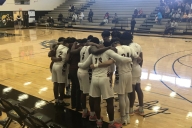You have /5 articles left.
Sign up for a free account or log in.
Northwestern University urged the National Labor Relations Board Thursday to reverse a regional director's decision that classified the university's football players as university employees, therefore allowing them to unionize.
The university's argument was backed by eight other private colleges, six Republican members of Congress, and the National Collegiate Athletic Association -- all of which filed amicus briefs Thursday ahead of the case's midnight deadline. Inside Higher Ed obtained about a dozen briefs, and other comments were likely submitted to the NLRB as well.
The NCAA, which is currently fighting several battles to halt the professionalization of college sports, said that the decision could have a “significant and irreversible, negative impact on the future of intercollegiate athletics and higher education in the United States."
"Maintaining the collegiate model of amateurism is crucial to preserving an environment where participation in sports is properly integrated into the total educational experience and plays an appropriate role in relation to the students' academic development," the NCAA stated in its brief.
This past spring, Northwestern football players approached the Chicago regional office of the labor board hoping to unionize as the College Athletes Players Association. The director of the office, Peter Sung Ohr, ruled that, under the National Labor Relations Act, scholarship football players at private universities are employees. Ohr said walk-on players -- those without scholarships -- do not qualify.
The Northwestern case differed from that of Brown University graduate teaching assistants, whom the NLRB ruled in 2004 were not eligible for collective bargaining, Ohr said, because "the players' football-related duties are unrelated to their academic studies, unlike the graduate assistants, whose teaching and research duties were inextricably tied to their graduate degree requirements."
The American Federation of Labor and Congress of Industrial Organizations argued a similar point in its brief urging the labor board to affirm Ohr's decision. While the AFL-CIO disagreed with the NLRB's 2004 decision, it said the two cases were different enough that there was no reason to revisit the earlier case.
"Given the financial benefit the University derives from the revenue generated by the football program, it is clear the players have a primarily economic, rather than academic relationship with the University," the AFL-CIO stated. "Undoubtedly, the players’ role in the football program is distinct from their role as students seeking to obtain an education from Northwestern."
The American Association of University Professors argued in its brief, however, that now is the time to return to the Brown decision. The brief mentioned football just once, using the opportunity instead to urge the labor board to overturn the 2004 ruling.
The AAUP points to an NLRB decision from 2000 that rejected New York University's claim that allowing collective bargaining for graduate students would violate an institution's academic freedom. In 2012, NYU reversed its position to agree with the NLRB, but in the interim, the NLRB had overturned that decision with the 2004 Brown ruling.
The board should return to its original conclusion that graduate students should be able to unionize, the AAUP said.
"At its core, the Brown University test of employee status is based on an erroneous understanding of the relationship between academic freedom and collective bargaining," the association stated.
Northwestern argues that the Brown decision is correct, but that Ohr did not correctly apply the precedent. The Brown case also appears in many of the briefs filed by the university's supporters, and six leading Republican members of the Senate and House education committees filed a brief arguing that Ohr did not correctly apply the National Labor Relations Act, either.
"Congress never intended for college athletes to be considered employees under the National Labor Relations Act, and doing so is incompatible with the student-university relationship," the lawmakers wrote in their brief. "The profound and inherent differences between the student-university and employee-employer relationship makes employee status unworkable both as a matter of law and in practice.”
The American Council on Education, in its brief, said characterizing athletes as university employees under the NLRA would result in a "regime of stifling regulation."
“All in all, to hold that scholarship student-athletes are employees would be an unprecedented intrusion into the educational missions of universities," ACE stated. "It would undermine education by impinging on academic freedom and would exacerbate many of the problems critics find with intercollegiate athletics.”
The council also said it worried that union bargaining would interfere with the decisions usually made between educators and students -- and that unions could negotiate for benefits that violate NCAA rules.
The College Athletes Players Association said in its own brief that that could happen only if the NCAA changed its rules allowing bargaining, a scenario it found unlikely.
"If the NCAA rules were to change such that there would be greater room for players to seek improved financial benefits through collective bargaining, the extent to which this might result in significant differences in the financial benefits provided to football players by the various schools would remain to be seen," CAPA said. "After all, if unreasonable demands were made by players, presumably universities would not agree to them.”
For at least one NCAA athlete's parent, the case is about far more than "athletes lobbying for a share of the money universities make off them." In a brief filed at the end of June, the parent, who submitted the comment anonymously, related several occasions in which coaches and athletic directors coerced students into putting the team's success over their education.
One of the parent's children was forced to miss a lab for an away game, the parent said, and then forced to miss the make-up lab because the coach wouldn't allow the student to skip a practice. College athletes, the parent said, must often settle for courses and degrees below their ambition due to time constraints put on them by athletic programs.
"This is about kids having some sort of representation so that they have protections on their future health, protections against ridiculous coaches, and a guarantee that their pursuit of a good education is honored," the parent said.








